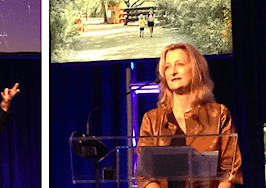
Jaime Casap
AUSTIN — Jaime Casap, chief education evangelist for Google, held out his smartphone. That hardware has revolutionized the real estate world and many will no doubt plunk down a cool grand to nab the latest version.
But to a kid that’s never known anything different, the smartphone is just the beginning. The smartphone is Generation Z’s Commodore 64, Casap told attendees at the annual Council of Multiple Listing Services (CMLS) conference today, referring to an early personal computer.
“This is the worst technology that [a] five-year-old will ever see in her life,” Casap said.
Today’s young kids won’t believe that we once had to plug our phones into the wall for hours every day, according to Casap.
“Those little five-year-olds are going to become your employees, your customers. Those little five-year-olds are going to see the world completely differently than you do,” he said.
That new phone? It’s Gen Z’s Commodore 64 #CMLS2017
— tessahultz (@tessahultz) September 14, 2017
That may be sobering thought for an industry whose MLS user interfaces still harken back to the early days of the internet. How to prepare for this new generation? Solve problems.
“What problem spins in your head? What knowledge and skills do you need to solve that problem?” Casap asked.
The next generation won’t be focused on climbing the corporate ladder, according to Casap. Rather, “they’re looking to solve the problems that we’ve been talking to them about for the last 15 years,” he said, referring to a 17-year-old who taught herself code and set her sights on more effective cancer diagnostics, building an artificial brain to detect breast cancer.
Younger generations approach learning and problem-solving differently than older generations, according to Casap. Every member of Generation Z is online every day, half of them for 10 hours a day, he said. They have eight-second attention spans and expect that if they want to learn something it will be available instantly — on their smartphones.
“They have the world at their fingertips and the expectation that that’s the way the world works. That changes everything. This generation is different because they’re the first true digital generation,” Casap said.
“And how do you find influential people in the community that can help you do that?” he added.
Google’s Baby Photo!#Squee #CMLS2017 pic.twitter.com/VOin5RiLPL
— tessahultz (@tessahultz) September 14, 2017
As technology advances, the roles of real estate professionals will change and automation will impact all jobs — though not necessarily eliminate them, he said. Facing hundreds of MLS executives — the traditional gatekeepers of listing data — Casap was blunt:
“Information no longer matters. Information is a commodity. Information has no value. What matters is what you do with that information,” he said.
“Ask yourselves, how are you using information to create intelligence and not just process information that anyone can get? How do you convert this information into something I can use?”
Technology will continue to accelerate and MLSs need to be able to constantly iterate and innovate, according to Casap.
“Ask yourselves what does innovation and iteration look like in your industry? How do you constantly move forward?” he said.
I’d like to note that Google’s innovation and iteration did not rely on getting approval from 750 committees #cmls2017
— Robert Hahn (@robhahn) September 14, 2017
He gave attendees a hint of what the future could look like: He and his wife bought a Google Home device a couple of months ago. They started asking Google Home to play them a song or tell them a joke. Their three-year-old daughter, a Spiderman fan, walked up to the gadget and said, “Google, play the Spiderman song.”
“She learned how to use it in one minute,” Casap said.
Google Home isn’t able to pick up kids’ voices yet, but when it does, he anticipates kids will ask it all kinds of questions and Google’s response may one day be tailored to what the device knows about the questioner — age, for instance.
Someday, that request will be: “Google, find me a house.” How will Google respond?
Using what it knows about the buyer to recommend homes and telling him or her where they are, Casap said. Sound familiar?
#CMLS2017 What happens when “Google” stops answering our questions and we become dependent on it telling us what to do and when to do it?
— Bryan Dean (@BGDean) September 14, 2017
Editor’s note: This story has been updated.












